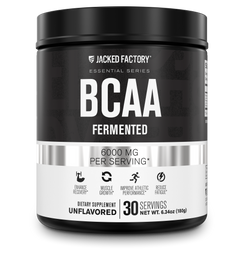What Is Conjugated Linoleic Acid (CLA)?
CLA (conjugated linoleic acid) is a group of at least 28 isomers of linoleic acid, an omega-6 fatty acid found predominantly in ruminants and their secretory products (e.g. dairy milk) [1]. Hence, the main dietary sources of CLA are meat and dairy products, especially grass-fed varieties. Humans and certain also produce small amounts of CLA endogenously, ostensibly regulated by certain bacteria in the gut microbiome [2].
Unlike synthetic trans-fats found in partially hydrogenated oils and shortening, CLA is a naturally occurring trans-fatty acid with a range of presumed health benefits, notably aiding weight loss, supporting cardiovascular function, and reducing the risk of cancer. While CLA seems to be moderately effective for reducing body fat, some researchers disagree about its usefulness and safety.
Here, we take a close look at the uses, benefits, and side effects of CLA supplements. We also examine the current literature to determine if conjugated linoleic acid supplementation leads to meaningful changes in body composition.
How Does CLA Work in the Body?

Of the known conjugated linoleic acid isomers, only two have demonstrable biological effects: cis-9, trans-11 (also known as rumenic acid) and cis-10, trans-12 [3]. We don't understand the remaining isomers of CLA and how they interact with biological tissues. Nevertheless, rumenic acid and cis-10, trans-12 CLA are the major conjugated linoleic acids found in ruminants and humans.
It appears the trans-10, cis-12 CLA isomer is responsible for lowering blood lipids and reducing body fat, while rumenic acid is the anti-carcinogenic isomer. It's also possible that these two CLA isomers act synergistically in the body to induce health effects, such as insulin resistance. Considering the pleiotropic effects of CLA and the ubiquity of fatty acids in the body, it's quite a complicated weight-loss supplement.
But we won't get too into the convoluted molecular science of the various CLAs; instead, we will focus on the broader surface-level implications of taking a CLA supplement.
Does CLA Work for Fat Loss?

CLA has been identified as a potential weight-loss supplement due to its promising efficacy in rodents [4]. Alas, the fat-burning effects of CLA in humans have been less substantial. A recent comprehensive research review indicates that supplemental CLA produces modest weight loss in humans and may improve body composition. Still, it's hard to draw definitive conclusions due to discordant observations across studies [5].
Another recent review of seven lengthier studies lasting a minimum of six months found that daily CLA supplementation leads to small but statistically significant increases in weight loss and fat mass compared to placebo [6]. After pooling the data from these studies, mean weight loss and mean fat loss were 0.7 kg (1.54 lbs) and 1.3 kg (2.86 lbs) greater in subjects taking CLA.
Moreover, the composition of isomers present in a CLA supplement will undoubtedly affect results. Remember, conjugated linoleic acid is not a single fatty acid but rather a collective group of related trans-fatty acids derived from linoleic acid.
What Are the Health Effects of CLA?
The numerous CLAs are thought to be beneficial for weight loss, heart health, immune function, and even protecting against cancer. Yet, evidence in humans is mixed, especially concerning the effectiveness of CLA supplements on body weight and muscle mass. More clinical research is needed to elucidate the benefits of these supplements.
While CLA has been mostly well-tolerated in human studies, there are some noteworthy potential side effects. Limited evidence suggests that supplementing with CLA may have pro-inflammatory effects contributing to insulin resistance/type-2 diabetes, metabolic syndrome, and atherosclerosis [7, 8]. However, these findings are seemingly refuted by other research showing no adverse effects of CLA at very high doses (20 grams per day) [9]. In fact, CLA has been shown to have anti-inflammatory effects in the brain and may improve blood lipid profiles by altering HDL and LDL cholesterol levels [10].
Arguably the most prominent side effect of conjugated linoleic acid is bowel irregularity, irritation of the gastrointestinal tract, and flatulence [11, 12]; it's not clear what causes this, but it's likely a ramification of alterations in gut microbiota after taking large doses of CLA for an extended period.
Should You Take CLA Supplements for Weight Loss?
Most of the in vivo research conducted on CLA thus far has involved animals, not humans. Unfortunately, mechanistic and pre-clinical studies of CLA cannot be extrapolated to humans, mainly due to a lack of consistent analyses, prolonged intervention periods, and follow-up studies.
Current clinical evidence shows that CLA supplements do not elicit significantly promising and consistent health effects [13]. Any weight-loss pills containing CLA that claim to reduce body fat should be approached with skepticism. You're better off looking for thermogenic supplements with more reliable ingredients, such as the caffeine, green tea extract, and Capsimax® found in Burn-XT™.

Products from grass-fed animals contain more CLA than those from grain-fed livestock. Grass-based diets improve fatty acid ratios in ruminants, which may explain the putative health benefits of switching to grass-fed dairy products [14]. Also, feeding animals plant sources of linoleic acids, such as sunflower, linseed, and safflower oil, increases the amount of CLA in beef and milk. So, you could always just eat more grass-fed food products to get a little extra CLA in your diet.





